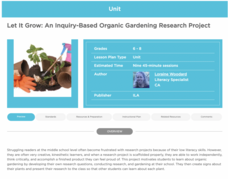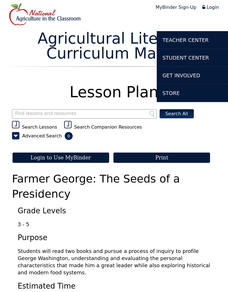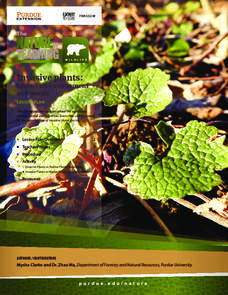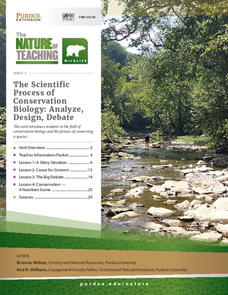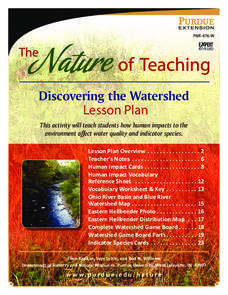Curated OER
Nurturing Green Thumbs at School
Incorporating a school garden into the curriculum cultivates many benefits.
Curated OER
Lesson Plan: Plant Life Cycles
Young scientists view videos to watch the changes through the life cycle of a plant. Then they will germinate seeds on a sock and in a plastic bag. Finally, they answer questions about the sequence of plant growth and record changes in...
ReadWriteThink
Let It Grow: An Inquiry-Based Organic Gardening Research Project
How does your garden grow? An inquiry-based, organic gardening unit asks young scientists to research a vegetable or flower, create an environment for it, and then plant and tend to the seedling. Gardeners develop their own research...
Agriculture in the Classroom
Farmer George: The Seeds of a Presidency
Three activities make up a lesson that explores the connection between former president George Washington, the farming industry, and leadership. Scholars listen to two read aloud, Farmer George Plants a Nation by Peggy Thomas and George...
DiscoverE
Everyday Engineering: Water Pollution Clean Up
Water, water, everywhere, but pollution is a major problem. Scholars design a filtration device or process that removes dirt and other particles from water. They use various household objects such as marbles, cotton balls, or coffee...
DocsTeach
Analyzing the Cotton Gin Patent
Decode primary sources in a fast-paced activity. A quick guessing game helps pupils use visual clues to understand primary sources. Academics look at a picture of the cotton gin and must guess what it is without other knowledge or clues....
University of Waikato
Farming and Environmental Issues
Forming ethical arguments is sometimes a complicated task. Guide classes through a process for forming and presenting ethical opinions. Learners consider the views of all stakeholders on the impact of farming on the environment and the...
University of Waikato
Growing Soil Microbes
View how microbes grow in soil. Class members first create a Winogradsky column to grow bacteria. They then set up the column of mud in a plastic bottle and include a food source for the microbes and observe the column of mud over the...
University of Waikato
Testing Water for Nitrate
How much is too much nitrate in the water? Young scientists discuss the question after they run their own nitrate tests. They also consider sources of nitrates and offer explanations for the levels.
Purdue University
Eco-llapse
A balanced ecosystem doesn't mean balanced populations. Budding scientists complete a series of activities to learn about the relationship between producers and consumers in an ecosystem. They complete the wildlife conservation...
Purdue University
Mammals and Ecosystems
Mammals have unique interactions with their ecosystems. Using a multi-part lesson, learners research local mammals using recommended websites and use their findings to create their own paper ecosystems including appropriate mammals. They...
Purdue University
Ashes to Ashes: We All Grow Up
Ecosystems are constantly changing whether people notice or not. An inquiry-based lesson examines types of ecosystem changes and how they relate to wildlife conservation. Learners classify changes as succession and disturbance using a...
Purdue University
Reptiles, Amphibians, and the Scientific Method
What do a reptile and an amphibian have in common? A three-part lesson allows scholars to investigate the similarities and differences between the two types of animals by identifying specific body parts. The lesson highlights the...
Purdue University
What a Waste of Food!
Follow the life of an apple from harvest to the consumer. A three-part lesson describes the different steps to get an apple from the farmer to your kitchen and the approximate waste that happens at each step. They discuss the process and...
Purdue University
Food Waste Solutions
Easy doesn't always mean better. In an era with pre-packaged everything, learners consider the environmental impact of the convenient trend. They critique the packaging of food and how waste impacts cost and then look for solutions.
Purdue University
Food Waste and the Environment
Out of sight out of mind can be a dangerous habit. Learners investigate the life of food waste after it leaves people's homes and its impact on the environment. They complete a series of three activities that involve building a mini...
Purdue University
Trees of the Midwest
All trees are not created equal. A set of three wildlife conservation lessons has learners examine the characteristics of individual trees. They look at the life cycle of the tree using a story and reference a field guide to identify...
Purdue University
Take-a-Hike
Learn about nature and health all in one set of lessons. Individuals use a scavenger hunt to record observations during a nature hike. They then complete activities to categorize their observations and rate the health of the habitat for...
Purdue University
Invasive Plants: Impact on Environment and People
It's the attack of the invasive species! Young scientists simulate the behavior of an invasive species with a game-like activity. They assume the roles of native plants, invasive plants, and resources and watch the invasive plant takes...
Purdue University
The Scientific Process of Conservation Biology: Analyze, Design, Debate
Scientists use data to learn about species survival—and your classes can too! A set of four lessons guides learners through a process to draw conclusions about the fluctuations in the population of the Hellbender species. They read...
Purdue University
The Great Clearcut Controversy
Urban development and habitat retention are often at odds. A three-part lesson examines the pros and cons of forest clearcutting. Learners review data and characteristics of a specific mammal to make conclusions about the effect...
Purdue University
Common Indiana Mammals
Mammals all have their own story to tell. A set of 34 cards outlines the key characteristics of different mammals. The cards include images of each mammal as well as their skulls and tracks. The back of the cards describe characteristics...
Purdue University
Coloration Exploration
Finding an animal in nature can be like a game of hide and seek. A thorough lesson explores different coloration strategies of animals. Pupils complete look-and-find puzzles and coloring sheets to differentiate between different types of...
Purdue University
Discovering the Watershed
Human impact on watersheds can make or break an ecosystem. Learners use a game to learn about the impact human choices have on water quality and the organisms that depend on it. The activity includes a game board and game cards that tell...




